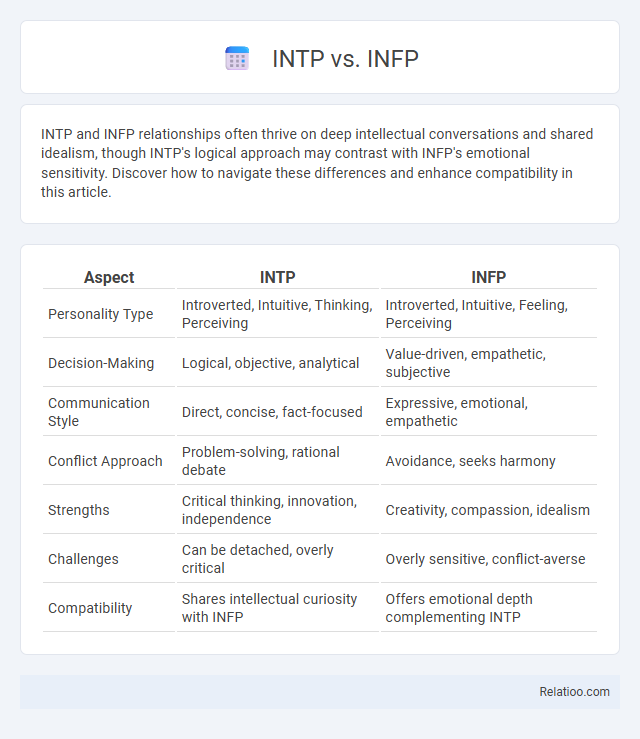INTP and INFP relationships often thrive on deep intellectual conversations and shared idealism, though INTP's logical approach may contrast with INFP's emotional sensitivity. Discover how to navigate these differences and enhance compatibility in this article.
Table of Comparison
| Aspect | INTP | INFP |
|---|---|---|
| Personality Type | Introverted, Intuitive, Thinking, Perceiving | Introverted, Intuitive, Feeling, Perceiving |
| Decision-Making | Logical, objective, analytical | Value-driven, empathetic, subjective |
| Communication Style | Direct, concise, fact-focused | Expressive, emotional, empathetic |
| Conflict Approach | Problem-solving, rational debate | Avoidance, seeks harmony |
| Strengths | Critical thinking, innovation, independence | Creativity, compassion, idealism |
| Challenges | Can be detached, overly critical | Overly sensitive, conflict-averse |
| Compatibility | Shares intellectual curiosity with INFP | Offers emotional depth complementing INTP |
Introduction to INTP and INFP Personality Types
INTP and INFP personality types, both part of the Myers-Briggs Type Indicator, focus on different cognitive processes: INTPs emphasize logical analysis and objective thinking, while INFPs prioritize personal values and emotional depth. Your understanding of these types reveals that INTPs excel in theoretical problem-solving, whereas INFPs thrive in empathetic and idealistic pursuits. Desire, influencing motivation, often drives INFPs towards authenticity and meaning, contrasting with the INTP's quest for knowledge and understanding.
Core Differences: Thinking vs Feeling
INTP personalities prioritize logical analysis and objective reasoning, making decisions based on data and principles, while INFPs emphasize personal values and emotional depth, guided by empathy and individual meaning. INTPs approach problems with detached curiosity and critical thinking, whereas INFPs focus on harmony, authenticity, and inner feelings. Desire in this context represents the underlying motivation: INTPs seek knowledge and understanding, INFPs pursue authenticity and emotional connection.
Shared Traits: Where INTPs and INFPs Overlap
INTPs and INFPs both exhibit strong individualism, valuing personal authenticity and deep intellectual engagement. Their shared preference for introversion means they recharge through solitary reflection and often seek meaningful conversations over small talk. Both types demonstrate curiosity and creativity, fostering innovative thinking driven by complex internal frameworks and idealistic visions.
Cognitive Functions: Breaking Down the INTP and INFP Stack
INTP cognitive functions prioritize Introverted Thinking (Ti) for deep analysis and Extraverted Intuition (Ne) for exploring possibilities, while INFPs lead with Introverted Feeling (Fi) focusing on authentic values and Extraverted Intuition (Ne) for imaginative insights. The desire driving INTPs often centers around intellectual coherence and understanding logical frameworks, contrasting with INFPs' pursuit of personal meaning, harmony, and ethical alignment. Understanding the distinct functions--Ti and Fi as dominant processes--and how Ne supports exploration in both types reveals how desire shapes their motivation and decision-making styles.
Communication Styles: Logic vs. Empathy
INTP communication style prioritizes logical analysis and objective reasoning, focusing on clear, concise arguments and problem-solving. INFP emphasizes empathetic understanding and emotional expression, seeking to connect through personal values and feelings. Your interactions with INTPs may challenge you intellectually, while INFPs offer deeper emotional resonance, balancing logic and empathy in communication.
Decision Making: Analytical vs. Value-Driven
INTP decision making centers on logical analysis, breaking down complex problems to reach objective conclusions, while INFP relies on deeply held values and emotions to guide choices that align with personal integrity. Desire influences the intensity and direction of decisions, pushing the INTP toward intellectual curiosity and innovation, whereas it drives the INFP toward authenticity and purpose. Understanding Your decision-making style helps tailor strategies that balance analytical reasoning with value-driven motivation for more effective outcomes.
Approach to Relationships and Friendships
INTP personalities approach relationships and friendships with a focus on intellectual stimulation and deep conversations, valuing autonomy and thoughtful analysis over emotional expression. INFP types prioritize emotional connection, authenticity, and empathetic understanding, often seeking meaningful and values-driven bonds with others. Desire often intensifies the pursuit of these connections, driving both types to seek profound, fulfilling interactions but influencing INFPs toward emotional intimacy and INTPs toward intellectual rapport.
Work Styles: Creativity, Structure, and Motivation
INTP individuals thrive in work environments that stimulate creativity through problem-solving and abstract thinking, often preferring autonomy over rigid structure. INFPs excel in roles that align with their values and foster personal expression, finding motivation in meaningful and authentic work rather than external rewards. Understanding your unique interplay between INTP's innovative mindset, INFP's values-driven approach, and your core desires can help tailor a work style that maximizes both creativity and motivation within a flexible framework.
Common Misconceptions About INTPs and INFPs
INTP and INFP personalities are often misunderstood, with common misconceptions portraying INTPs as cold and overly analytical, while INFPs are seen as overly emotional and impractical. Your desire for clarity about these types may reveal that INTPs possess deep empathy beneath their logical exterior, and INFPs combine idealism with a strong sense of rationality. Understanding these nuances helps dispel stereotypes and highlights the complex, multifaceted nature of both INTP and INFP individuals.
How to Identify If You Are INTP or INFP
Identifying whether you are an INTP or INFP involves examining your cognitive functions and emotional responses; INTPs prioritize logical analysis and objective problem-solving, relying heavily on Introverted Thinking (Ti) and Extraverted Intuition (Ne). INFPs, conversely, are guided by Introverted Feeling (Fi) and Extraverted Intuition (Ne), focusing on personal values, authenticity, and emotional depth in decision-making. Observing how you process information--whether through detached reasoning (INTP) or empathetic, value-driven reflection (INFP)--helps distinguish these personality types distinctly.

Infographic: INTP vs INFP
 relatioo.com
relatioo.com